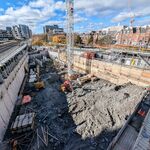scarberiankhatru
Senior Member
This is always a fun read. The post asks us to "change one thing" but the vast majority of responses list far more than one.
The original poster listed two things when asking for one.
This is always a fun read. The post asks us to "change one thing" but the vast majority of responses list far more than one.
Permit new places of worship in places other than industrial parks...encourage them, even. Established neighbourhoods have Christian and Catholic churches, and a few synagogues. Nothing else. In recent decades, the city has seen dozens, perhaps hundreds, of new religious buildings built, and practically all of them have been located in middle-of-nowhere industrial parks. Or, congregations have to rent industrial units. Now, the city is worried about losing employment land to places of worship. Well, gee, if you limit temples and mosques and Chinese Baptist churches and so on to only industrial parks, they just might take up some space.
IIRC commercial zoning does not permit places of worship. The reason they are frequently found there is simple economics. The land/buildings are dirt cheap.
The original poster listed two things when asking for one.
Heavens, even the Nathan Phillips Square re-do was adjudicated by some egghead who ruled that the ugly (and useless) overhead walkways had to stay.
Actually, the impetus behind the redo--a literal "egghead" (follicularly speaking), Councillor Peter Milczyn--was all for removing the walks. Then the heritage and architectural community stepped in and stopped him dead in his tracks on that count.
They certainly didn't seem "useless" last time I actively experienced them (kibbitzing the Olympic torch run)--heck, the threat to their existence probably helped give them new life by forcing the City to reopen them, etc...
I know this board well enough that everyone would have plenty to say. Keeping it to one is tough!
No, it's not just simple economics (proper city-building never is). Neighbourhoods are no longer planned with places of worship in mind, so they must locate where they can find room. A few tiny congregations may be able to lease storefronts or convert houses, but larger ones cannot. It was easy integrating these places into communities when only a small number of Christian denominations were building churches, but it's not as easy now, and the city needs to deal with it in ways that don't just run them out of town. Even if places of worship had free rein in terms of zoning, there's no guarantee mega-developments like the Portlands - let alone mega-developers like Concord or Tridel - will plan for them or that any will actually get built on Avenues, it can't be done without taking the first step of reexamining zoning and parking policies. They need lots of land for cheap surface parking, but they need much of this parking because of their inaccessible locations...the city should interfere with this circular dilemma.
I'd love to remove the Greater Toronto Area from the Province of Ontario & have Toronto bequeathed Provincial Staus or at the very least be given the powers of a Province thus freedom from 1 layer of Government, bring policy decisions & power closer to the citizens that live the day to day realities.
The City of Toronto & the Greater Toronto Area send more in Tax Dollars to both Queens Park & Parliament Hill than we ever receive back in services. Barely anything can be accomplished in this Metrolpolis decade after decade due to layers of beauracracy, political infighting etc. etc.
This system of Governening we are saddled with was created over 140 years ago in an era before Automobiles, planes, modern telecommunications. It doesn't work today it hasn't worked for decades !
Toronto Freedom NOW !
So you would turn Toronto into an isolated island? As a surrounding municipality the first thing I would do is charge enormous transit duties into and out of your island, huge transport charges, and lure away business and immigration through the availability of cheaper land, homes and greater job opportunities. Heck, it may not work but I'd sure as hell try. Besides, relative to other more prosperous parts of the province there are probably just as many in the 416 drawing from the 'system' as contributing to it anyways...
And what a celebration of good will and provincial spirit you advocate, that we all turn into ourselves and screw our neighbours such that the fittest survive and the rest may freeze and starve in the cold. Makes the heart swell with pride...
Interesting that you dismiss the economic argument then go on and make an economic argument. Of course we won't see any large Institutional Places of Worship in the Portlands. Nor will we see any on the old Kodak lands. Concord, Tridel and other developers have little interest in selling land for a fraction of what it is worth relative to residential development. As you said, the institutions need cheap land. Even on the Avenues, served with higher level transit the economics do not work. I wouldn't worry about running them out of town though. Toronto's industrial space is much cheaper (predictably) than surrounding municipalities. Which explains why Toronto has a much higher proportion of such converted space.
Actually, the impetus behind the redo--a literal "egghead" (follicularly speaking), Councillor Peter Milczyn--was all for removing the walks. Then the heritage and architectural community stepped in and stopped him dead in his tracks on that count.
They certainly didn't seem "useless" last time I actively experienced them (kibbitzing the Olympic torch run)--heck, the threat to their existence probably helped give them new life by forcing the City to reopen them, etc...
Yup, the egghead(s) I referred to were from the heritage and architectural communities. Other members of the architectural community (Jack Diamond, for one) have favoured taking the damned things down. Presently the City has reopened them, but I'll bet that they'll become derelict again within ten years after the renovation.




